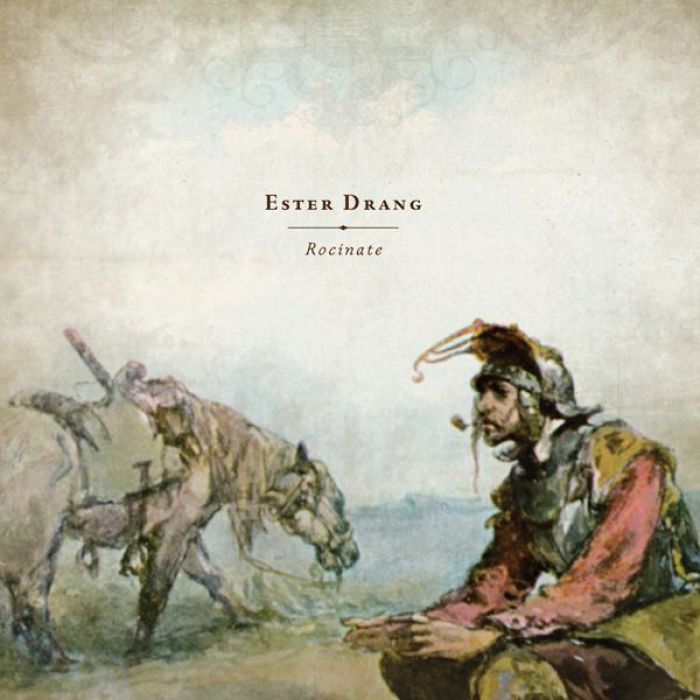Rocinate by Ester Drang (Review)

On Ester Drang’s previous releases, 2003’s Infinite Keys and 2001’s Goldenwest, the first minute or two was a clear indicator of the sounds and moods that awaited you throughout the disc. Infinite Keys began with metallic squalls and harrowing strings, which set the stage for the album’s sparse setup and lyrical themes of struggle and doubt. On the other hand, Goldenwest began with a shimmering wall of sound, equal parts Spiritualized and Steve Reich, and the rest of the album continued along that tack.
That trend stops with Rocinate, Ester Drang’s most unpredictable, diverse, and progressive album to date. “Come Back Alive” begins with string-like drones, a sound not at all unfamiliar to longtime fans. However, it merges those with a stomping, almost funky bassline and drumbeat, takes a sharp turn with a dancing piano line and glassy guitar crescendo at the halfway point, and ends on a downturning, introspective trumpet denouement. The only consistent element is frontman Bryce Chambers’ clear, pensive voice.
The remainder of the album remains unpredictable, moving between the Coldplay-esque pop on “Valencia’s Dying Dream” (though, in truth, the song is far more interesting than anything Chris Martin and Co. have done) to the somber, electronic beat-laced melancholia of “Grave Mistake” to the driving syncopations, reverbed horns, and dub textures of “Caledonia.”
It’s exciting to hear the band stretch themselves in so many ways, moving well beyond their droney, shoegazer roots and playing around with John Barry-esque arrangements, electronica, dub, and even the odd gamelan or two. True, the band have incorporated some of these things into their music before, but never quite as fully as they do here.
But all of this progression does have a price. So many elements are crammed into the songs that the album doesn’t achieve the same consistent and arresting mood that, say, Infinite Keys had. And sometimes, it causes the individual songs to stumble a bit as they try to ingest and include everything that’s packed into them.
For example, “Smoke And Air” begins with the lovely metallic tones of a gamelan, which are always welcome to this ear, but then the song transitions into something resembling a lush 50s ballad a la The Autumns’ Le Carillon, which just feels a bit awkward. And even moreso when the gamelan is reintroduced, and a lazy trumpet is laid over top (which foreshadows the horn gallery at the song’s end). Individually, each of these are lovely enough, but the whole is something less than the sum.
However, these moments are few and far between, and are vastly outshone by the disc’s strong moments.
The billowing string arrangements (courtesy of Frank Lenz) that open “Hooker With A Heart Of Gold” are instantly arresting, giving the song a mature, exotic flavor. The song drifts by on Chambers’ croon, and while strings, horns, and maybe even a gamelan touch or two can be heard, they remain subdued, coming to the forefront only when their presence is required. The horn arrangement is especially lovely here, adding to the melancholy and longing in Chambers’ voice.
The ambient sounds that flutter and drift through “Great Expectations” may remind folks of Brian Eno’s work on The Joshua Tree, but the song remains more subdued than anything U2 has done. Although Chambers’ voice is present, the track feels more like a moody instrumental, weaving together distorted guitar laments and stark, Reich-esque percussive layers. And as Chambers’ laments “All I have is all I can give,” his voice fades and is replaced by a haunting, ghostly chorus of disembodied voices that carries out the song in the album’s most chilling and haunting moment.
Those same ambient textures can be heard on the album’s closing track, “Proustian Moments.” But here, they’re weightier, almost overwhelming, casting a thundercloud-like pall over the song that waits to be pierced by even more trumpet (if there’s one instrument that Ester Drang loves on the new album, it’s the trumpet). It’s a mercurial end to a mercurial album, one that dramatically increases the sonic palette that Ester Drang employs.
Rocinate is not without its weaknesses, but those only come as a result, I think, of being too ambitious. And I’d rather see a band stumble as a result of being too ambitious and adventurous than because they chose to stick with a tried and true formula.